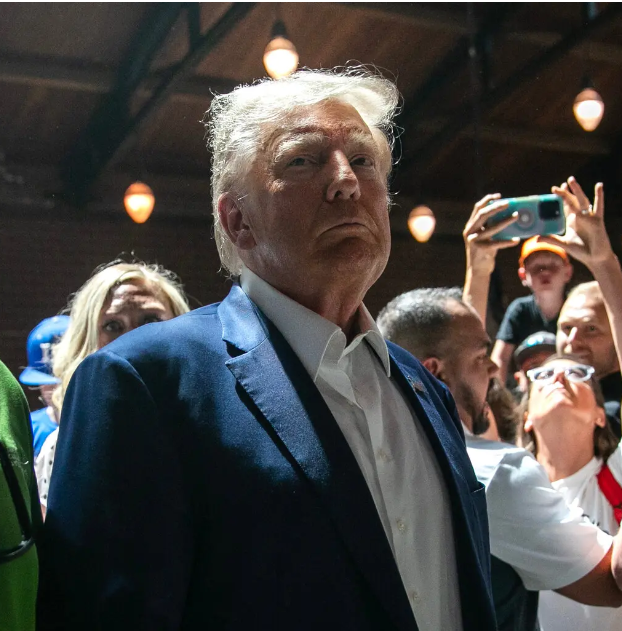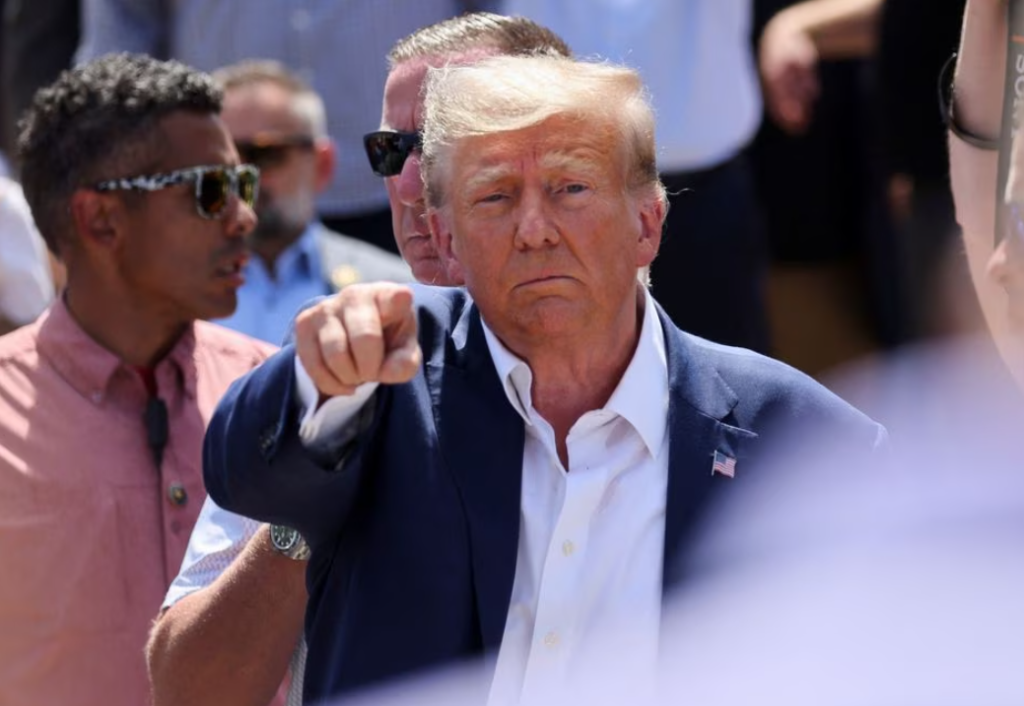Georgia hits Trump.
WASHINGTON, Aug 15 (Reuters) -Georgia hits Trump faced a new set of legal woes on Tuesday after a Georgia grand jury used a law developed to take down organized crime gangs to charge the former U.S. president in a scheme for trying to overturn his 2020 election defeat.
The charges, brought late on Monday by Fulton County District Attorney Fani Willis charge Trump, the front-runner in the race for the 2024 Republican nomination and 18 associates for a scheme intended to reverse his loss to Democrat Joe Biden

The sprawling 98-page indictment listed 19 defendants and 41 criminal counts in all. All the defendants were charged with racketeering, which is used to target members of organized crime groups and carries a penalty of up to 20 years in prison.
Mark Meadows, Trump’s former White House chief of staff, and lawyers Rudy Giuliani, Jenna Ellis and John Eastman were among those charged.
“Rather than abide by Georgia’s legal process for election challenges, the defendants engaged in a criminal, racketeering enterprise to overturn Georgia’s presidential election result,” Willis said at a press conference.
Trump called the indictment a “witch hunt” in a social media post and accused Willis of trying to sabotage his presidential comeback bid.
He said he would release a report on Monday on “Presidential Election Fraud” that would exonerate him. “They never went after those that Rigged the Election. They only went after those that fought to find the RIGGERS!” he said.
Since his defeat in 2020, Trump has repeatedly made false claims that the election was marred by widespread fraud. Those claims have been rejected by courts, state reviews and members of his own administration.

Giuliani, who rose to national prominence by using racketeering laws to take down New York mobsters in the 1980s, said prosecutors in this case were “the real criminals.”
Lawyers for other defendants either declined to comment or did not respond to a request for comment.
‘FIND’ VOTES
The 13 felony charges against Trump matched those listed on a document that was briefly posted on the court website earlier in the day and reported by Reuters before it disappeared.
In a Jan. 2, 2021, phone call, Trump urged Georgia’s top election official, Brad Raffensperger, to “find” enough votes to reverse his narrow loss in the state. Raffensperger declined.
Trump’s supporters stormed the U.S. Capitol four days later in an unsuccessful attempt to prevent lawmakers from certifying Biden’s victory.
The indictment cites a number of crimes that Trump or his associates allegedly committed from before the Nov. 3, 2020, election until September 2022, including falsely testifying to lawmakers that election fraud had occurred and urging state officials to alter the results.
It says the defendants tried to subvert the U.S. electoral process by submitting false slates of electors, people who make up the Electoral College that elects the president and vice president.
BREACHING VOTING MACHINES, HARASSING ELECTION WORKERS
It alleges that defendants breached voting equipment in a rural Georgia county, including personal voter information and images of ballots.
Prosecutors also said the defendants harassed an election worker who became the focus of conspiracy theories.
The indictment reaches across state lines, saying that Giuliani, Meadows and others called officials in Arizona, Pennsylvania and elsewhere to urge them to change the outcome in those states.
The indictment mentions 30 other co-conspirators, though they were not named or charged.
Trump has denied any wrongdoing and has pleaded not guilty in three other criminal cases.
He faces a New York state trial in March 2024 involving a hush money payment to a porn star, and a federal trial beginning in May in Florida for allegedly mishandling federal classified documents. In both cases Trump pleaded not guilty.
A third indictment, in Washington federal court, accuses him of illegally seeking to overturn his 2020 election defeat. Trump denies wrongdoing in this case as well, and a trial date has yet to be set.
Georgia, once reliably Republican, has emerged as one of a handful of politically competitive states that can determine the outcome of presidential elections.
NOT HURTING HIS CAMPAIGN
Strategists said that while the indictments could bolster Republican support for Trump, they may hurt him in the November 2024 general election, when he will have to win over more independent-minded voters.
In a July Reuters/Ipsos poll, 37% of independents said the criminal cases made them less likely to vote for him.
Willis’s investigation drew on testimony from Trump advisers including Giuliani, who urged state lawmakers in December 2020 not to certify the election, and Republican state officials such as Raffensperger and Governor Brian Kemp, who refused to echo Trump’s false election claims.
Raffensperger has said there was no factual basis for Trump’s objections, while Kemp certified the election results despite pressure from within his party.
Additional reporting by Sarah N. Lynch, Rami Ayyub, Jack Queen, Tim Ahmann, Andrew Goudsward, Kanishka Singh, Nilutpal Timsina and Susan Heavey; Writing by Andy Sullivan; Editing by Scott Malone, Howard Goller and Daniel Wallis.
